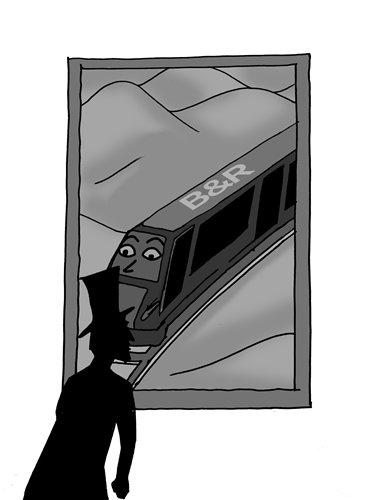COMMENTS / INSIDER'S EYE
China should shrug off Indian scholar's slander against B&R
China should shrug off slander against Belt and Road

Illustration: Luo Xuan/GT
At the end of 2017, Brahma Chellaney, an analyst at the New Delhi-based Centre for Policy Research, posted an article titled China's Creditor Imperialism. The article distorted China's image by claiming that it was aiming to shackle its partners with debt, forcing them to hand over domestic resources to China in order to pay it back. It also accused the Belt and Road (B&R) initiative of being a plan to achieve China's imperial ambition.
The article attempted to arouse memories of new colonialism after World War II, drawing a connection between China and the plundering of resources by some Western countries in African and Asian countries.
This is just a new version of the China threat theory, aimed at arousing suspicions in B&R countries and disturbing the smooth carrying out of local projects, especially those using development financing. These claims of conspiracy and imperial ambition are intended to hinder the pace of China in "going out" and to hold back the country's rise.
It seems that emphasizing that China is interested in peace rather than military expansion is not enough anymore.
This new round of negative opinions risks damaging China's image not only at the macro level, but also at the micro level such as project details, specific operations and financial accounting. It means more elaboration is required as the B&R enters the strategic development stage.
Chellaney accuses China of making a profit while adding to the debts of poor countries. But he was using static EU criteria that are not suitable for emerging economies. Take Sri Lanka as an example. Hambantota Port has helped to boost Sri Lanka's economic growth. Chinese companies won the 99-year port lease bid through experience, skill and appropriate financing for the construction. The terms of the lease are normal in Sri Lanka and apply to any firm from any country. Sri Lanka can both pay its debts and maintain sustainable economic growth. This project is a good example of complementary advantages and mutual development.
Bringing the B&R to a deeper level requires more accurate evaluation and orientation regarding variables like geopolitical and economic effects, debt sustainability and social harmony. And to avoid false accusations, China has to improve the transparency of the projects. Most countries along the B&R route are emerging economies, which have weaker economic foundations, unstable regimes and lower debt repayment abilities. More transparent investment planning and financial forecasts will therefore be an encouragement for Chinese firms.
In the face of the continued smears and slander, China has to prepare psychologically and strategically to push ahead.
The B&R is a project of the century that will require great endurance. Instead of temporary initiatives, the B&R is long term strategy vital to the rise of China, and it also represents the goodwill of the Chinese nation. To make the B&R long lasting, new projects will have to be started while old ones are consolidating. Hard connectivity like infrastructure, soft connectivity in terms of policies and smart connectivity with local people all need to be promoted.
China should push the key B&R projects with the spirit of conquering difficulties. Focusing on how to make each project better rather than pursuing a larger number of projects is the current priority. Priority should be given to a few friendly nations, geopolitical pivot cities, and stable projects.
Teams responsible for cooperation in terms of government, industry and research should be assembled to help with projects such as the China-Pakistan Economic Corridor and the Suez industrial park in Egypt. Working with universities, think tanks and the media is also vital since the B&R project can become a case study for business school courses. The B&R symbolizes China's support for globalization, but a focus on quality is also required. China has proved to international society that it is willing to work with countries that can understand and are interested in proper cooperation.
It does not mean that China is being picky - these are simply the rules of the market and of business. After 40 years of reform and opening-up, China has accumulated considerable development experience. Chinese firms that have expanded abroad have also boosted the country's credibility. With the confidence this provides, the B&R will be more valuable and fascinating.
While there may be some skepticism and doubts about the B&R, we should recognize that this is inevitable in the process of China's rise, and just shrug it off. Some people view the B&R as a new stage of reform and opening-up. In that case, misunderstandings and slander such as Chellaney's article will only be at the beginning - success and a promising future is what will come.
The author is executive dean of the Chongyang Institute for Financial Studies at Renmin University of China. bizopinion@globaltimes.com.cn

